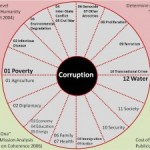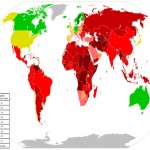
One of President Obama's unintended achievements has been to bring the moral bankruptcy of the Orwellian-named Middle East Peace Process into sharp relief: By trying to bribe Netanyahu into returning to the bargaining table with an offer of 20 additional F-35 Fighters in return for a 90 day extension of a phony settlement freeze, and then seeing Netanyahu stuffing it to Obama, theater of the absurd came into full view. Perhaps, however, the crisis is darkest before the dawn. Jeff Halper (bio), an Israeli activist with American roots, lays out the possibility that Obama's failure inadvertently opened the door for what would certainly be a messy and painful, but possibly successful game-changing scenario for way out of this intractable conflict.
I admire Halper and his good works, but I am not so optimistic. All revolutions are pathways into the future fueled by any interplay of chance and necessity; and therefore, their outcomes are, by definition, unknowable: apartheid in South Africa may have produced F. W. de Klerk and Nelson Mandella; but in Rhodesia (Zimbabwe), it produced Ian Smith and Robert Mugabe. In Israel, apartheid has produced Binyamin Netanyahu, Avigdor Lieberman, and a unifying mixture of neofascism and narcissism on one side, but no one of Mandella's moral stature or even an opposing unifying ideal on the other. That said, Halper's essay is very important and worth thinking about. Chuck

Palestine 2011
By Jeff Halper
November 25th, 2010
Phi Beta Iota: This is an EXTRAORDINARY piece of balanced thinking, relevant to all who wish for peace and shared prosperity in the Middle East and elsewhere. Gaza is Ground Zero for the moral and intellectual failure of US “national security” and foreign policy, and this one article puts it all into focus.
Read original article recommended by Chuck Spinney….
Jeff Halper is the Director of The Israeli Committee Against House Demolitions (ICAHD).
Also recommended by Chuck Spinny:
The Drums of War Are Heard Again In Israel, By Ilan Pappe, GlobalResearch, 27 December , 2010
See Also:
Continue reading “Journal: Obama, Palestine, & Forces of History”





